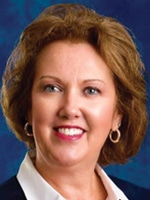September 2021—SARS-CoV-2 spread and the staffing shortage drove the conversation when Compass Group members met Aug. 3 for their monthly call led by CAP TODAY publisher Bob McGonnagle.
“Like others, we were seeing problems before COVID, but COVID seems to have kicked it into overdrive,” Steven Carroll, MD, PhD, of the Medical University of South Carolina, said of the shortage. And more long term, it’s time to jump-start training programs, he and others say.
The Compass Group is an organization of not-for-profit IDN system laboratory leaders who collaborate to identify and share best practices and strategies. Here is what they shared last month.
Stan Schofield, has MaineHealth seen breakthrough infections?
Stan Schofield, president, NorDx, and senior VP, MaineHealth: Yes, we’re having breakthrough infections every day. So far we know of 20 breakthroughs in the past few weeks of employees of the system who are fully vaccinated. They’re doing sequencing on this to see what’s going on. Our vast majority of positives are unvaccinated people under the age of 40, 45.
Jennifer Laudadio, what’s going on in Little Rock? And are you at the mandatory vaccination stage or in discussions about it?
Jennifer Laudadio, MD, professor and chair, Department of Pathology, University of Arkansas for Medical Sciences College of Medicine: Our legislature passed a rule that as a state entity we cannot mandate vaccinations, so we’re not having the conversation, although they are trying to get the legislature to reconsider.
Test volumes are similar to those in January and February. We have 10 hospitalized patients currently who were vaccinated. Most of our vaccinated patients don’t need ICU-level care. They tend to be older or immunosuppressed or have other underlying conditions.
Clark Day, tell us what’s going on in Indianapolis.
Clark Day, VP of system laboratory services, Indiana University Health: At IU Health vaccines are mandated for 36,000 team members. The mandate went into effect in May and team members were given until September 1 to be fully vaccinated. To date, about 80 percent of IU Health team members are compliant.
In Indiana about 44 percent of our total population is vaccinated. Our health system has had a few breakthrough infections. A handful of our pathology team members have experienced the breakthrough.
Sarah Province, tell us about Orlando’s situation.
Sarah Province, director of laboratory operations, AdventHealth: Testing is increasing, and our positivity rate in central Florida is 25–35 percent. For employees only we’re running 15–20 percent positivity rate with over 200 employees tested each week. We do have breakthrough infections. We discontinued preop screening for specific outpatient populations, GI patients, and pediatrics in June. We’re running between 700 and 800 tests a day at the Orlando campus.

Dr. Antonara
Stella Antonara, tell us about mandatory vaccinations in Columbus and breakthrough infections.
Stella Antonara, PhD, D(ABMM), medical director of microbiology, OhioHealth: It was announced today that we’re going to have mandatory vaccination, and they’re giving people until December. Those choosing not to be vaccinated will require weekly testing. It’s my understanding that the other health systems in central Ohio will have a similar policy.
We have seen breakthrough infections and we work with Ohio Department of Health to sequence these patients.
Steve Carroll, same question for you.
Steven Carroll, MD, PhD, chair, Department of Pathology and Laboratory Medicine, Medical University of South Carolina: We went mandatory with vaccinations almost immediately after Houston Methodist Hospital won its case. We are seeing breakthrough infections but not a large number. Yesterday’s positivity rate was just shy of 20 percent and we have a lot of people coming into the hospital. Greater than 90 percent of the cases are delta.
Peter Dysert, are you seeing what your colleagues here are reporting?
Peter Dysert, MD, chief, Department of Pathology, Baylor Scott & White Health: We’re seeing the same. Our inpatient census is probably about a third of what it was at peak. Almost all of our admissions now are unvaccinated, and those who are vaccinated but immunocompetent seem to have a five- to seven-day flulike illness not requiring hospitalization. Incubation time seems to be a little shorter with the delta variant, and they have high viral loads.
How worried are you that this is likely to spin out of control again?
Dr. Dysert (Baylor): Each day our census appears to be creeping up. We had been told to prepare for a peak that was roughly 25 percent of our peak in the early stages, but we’re already at that number and probably will exceed it.
Dwayne Breining, what is it like now in New York and what are your predictions?
Dwayne Breining, MD, executive director, Northwell Health Laboratories: The positivity rate is about three percent, which is about twice as much as it was two weeks ago. We’re above 80 percent delta variant. Almost all admissions are among the unvaccinated. In New York about 70-plus percent of the people eligible for vaccine are vaccinated, so we don’t think our numbers can get all that high, but we are watching a bit of a resurgence and it is sorting right along the zip codes where the vaccine rates are the lowest.
Greg Sossaman, Louisiana is having an outbreak and has low rates of vaccination. Tell us what you’re experiencing at Ochsner.
Gregory Sossaman, MD, system chairman and service line leader, pathology and laboratory medicine, Ochsner Health: Louisiana does have a low vaccination rate and a positivity rate now above 20 percent, and more than 90 percent of that is delta. We do not have a vaccine mandate. Our state attorney general told us we would be sued, and he has already sued a medical school within the state for mandating vaccines prior to their being fully approved. For those who are not vaccinated at Ochsner, which is still a significant portion of our employees, we are moving to mandatory N95 masks and weekly testing.
We’ve seen very few breakthrough infections, but of those we have seen the patients are all well.
Hospital beds are close to full. We put a COVID ward back in place. We’re redistributing nurses and physicians, similar to what was done in the initial surge. The biggest problem is staffing. We need staff to expand the number of our ICU beds to help the local hospitals whose beds are full.
Lauren Anthony, what is Allina seeing in Minneapolis?
Lauren Anthony, MD, system laboratory medical director, Allina Health: We’re seeing an uptick. We were starting to ease up on some of our pre-procedure testing, but now they’re looking to halt those plans and roll back to what they were doing before when everyone was tested. We have seen breakthrough infections and the risk factors are the common ones.
We’re working now on the approach to the flu season—which platform to use, because some of the best tests available for testing flu along with COVID come prebundled. They’re putting multiplex cartridges together, but what do you do when you need only flu and COVID and you have a multiplex cartridge with other things on it? How do you manage the orders for that or providing results for tests that aren’t needed or weren’t specifically ordered? Test utilization, billing, and so forth are the concerns.
Yes, there is a lot of concern around panels—their costs, getting reimbursed.

Anthony
Lisa Anthony, tell us what HNL Lab Medicine is experiencing.
Lisa W. Anthony, MS, MT, DLM, senior VP for strategic initiatives, HNL Lab Medicine, Lehigh Valley Health Network, Allentown, Pa.: Today our network in conjunction with two neighboring networks jointly announced mandatory vaccinations will be required for colleagues and nonemployed partners after the first COVID-19 vaccine receives full FDA approval. We will have eight weeks post-approval to comply with this mandate.
Pennsylvania is now considered to be a high transmission state but is not currently tracking breakthrough cases. HNL is, however, performing NGS and while we are not seeing significant breakthrough case numbers, all have been the delta variant.

Carbonneau
Eric Carbonneau, how are things in Albuquerque?
Eric Carbonneau, MS, MT(ASCP), director, laboratory operations, Woodward Labs and TriCore Research Institute at TriCore Reference Laboratories: A few breakthrough cases but most are minor illnesses. Our hospitalizations are mostly the unvaccinated. We are sitting at about 65 percent fully vaccinated in the 12 and over population. Our positivity rate jumped from about one percent to six percent and a majority is delta. We’ve also seen a spike in parainfluenza and RSV cases.
The University of New Mexico is the first public entity in the state to require vaccination to attend in person.
Dan Ingemansen, what’s the situation in Sioux Falls?
Dan Ingemansen, senior director, Sanford Health: The expectation is all employees are vaccinated or obtain an exemption by November 1. Following this announcement, we had a protest last week in front of one of our medical centers, but overall we’re getting support and good feedback from the communities we serve.
 CAP TODAY Pathology/Laboratory Medicine/Laboratory Management
CAP TODAY Pathology/Laboratory Medicine/Laboratory Management
